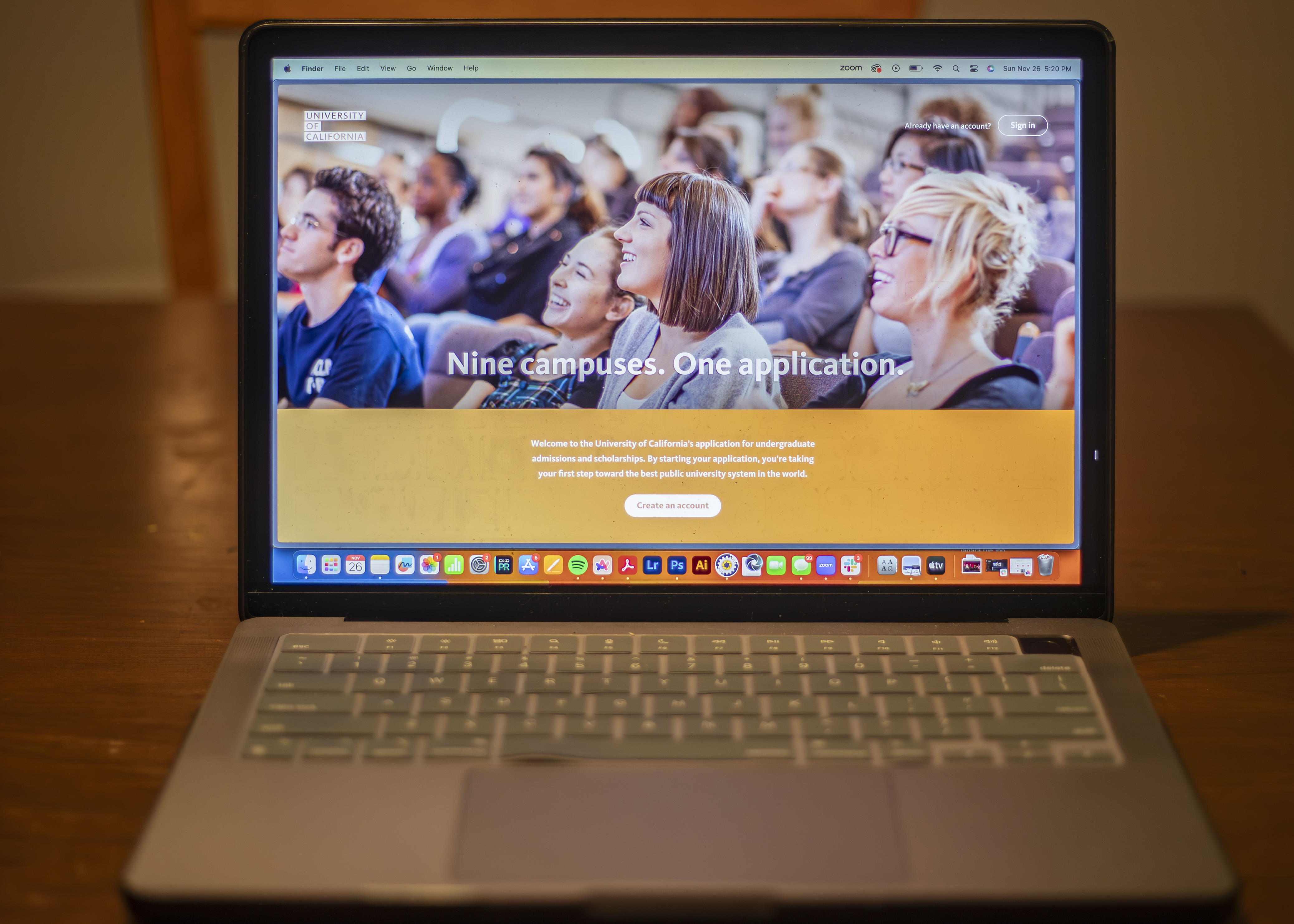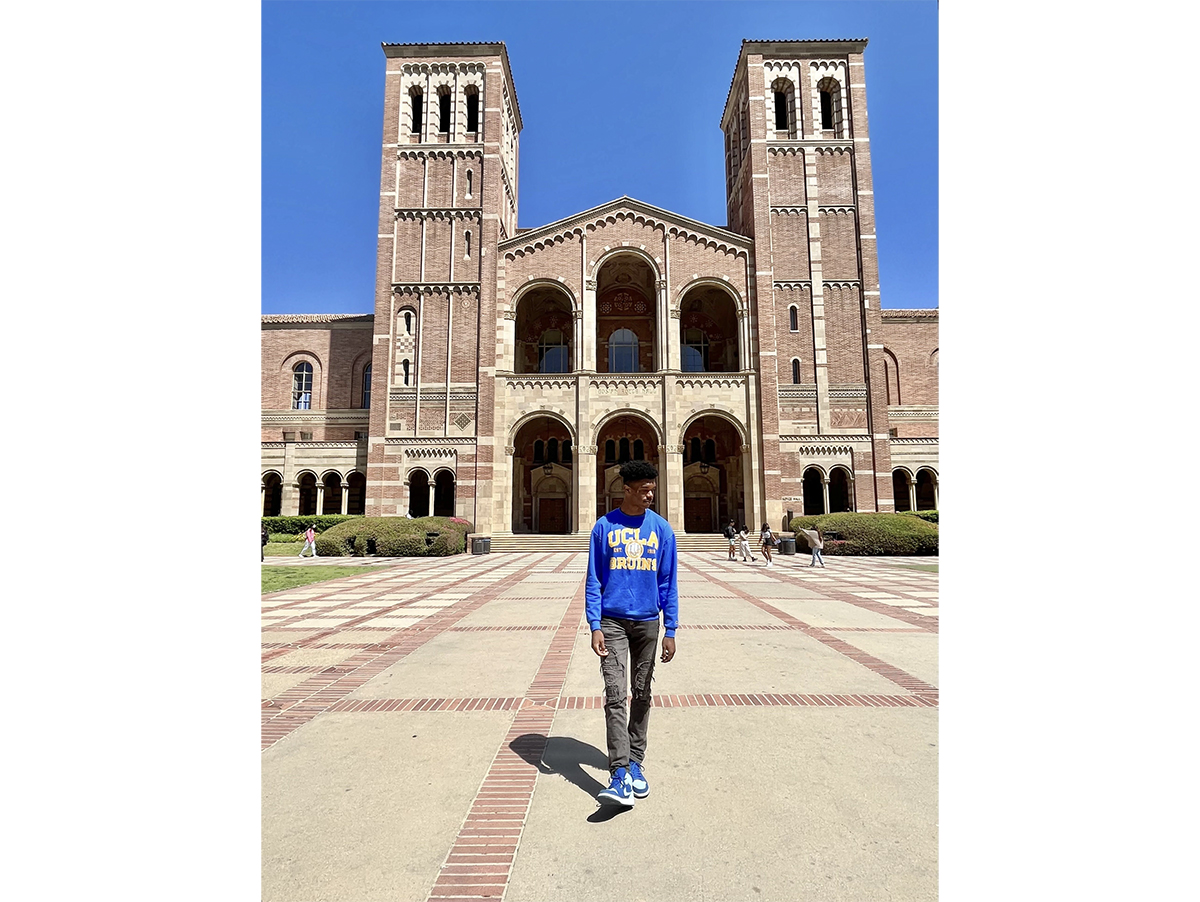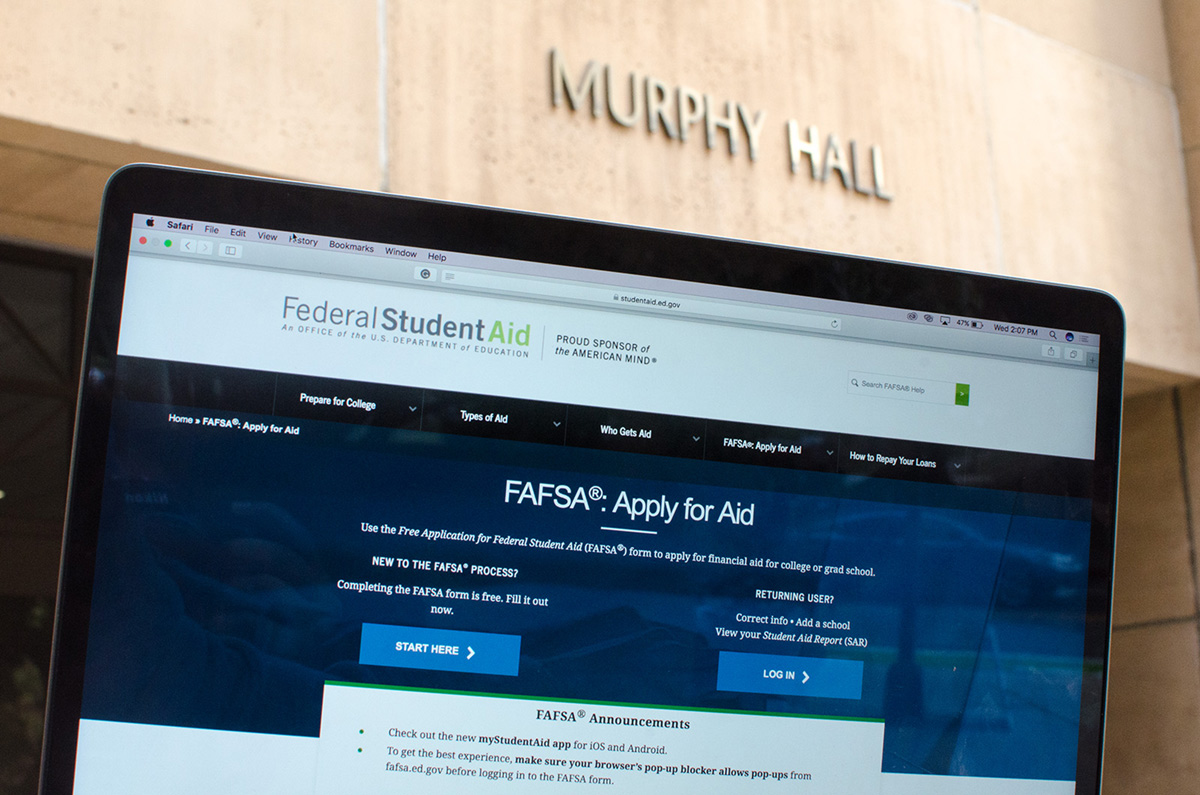Opinion: College application process sustains inequality and exhausting expectations

The UC admissions website is pictured. The U.S. college admissions process pressures students and contributes to systemic inequality, argues Sierra Benayon-Abraham. (Joseph Jimenez/Photo editor)
By Sierra Benayon-Abraham
Nov. 26, 2023 6:15 p.m.
This post was updated Nov. 26 at 10:23 p.m.
Take the maximum number of Advanced Placement classes you can fit into your schedule. Be your class president. Get fives on your AP exams.
Be a varsity athlete and captain of the football team. Earn a near-perfect score on your SATs. Be a leader in your community and volunteer at the local food bank after school.
Do all of this while retaining a perfect 4.0 GPA.
Only then, they tell us that you stand a chance of being admitted into your dream school or any prestigious university.
This is what the college admissions process has become for high school students all across America.
Starting from elementary school, children are molded to embody the type of student that college admissions officers search for. Every year, the number of applications rises and acceptance rates plummet as the amount of “optional” but necessary supplements escalates. Prospective students are then forced to grapple with becoming a new type of perfect – one that coincides with being a competitive candidate for college admissions.
The moment a student enters their senior year of high school, the chaos begins: research into financial aid eligibility, scholarships, the creation of pro and con lists for dream versus safety schools and brainstorming admission essay topics.
It has become nearly impossible to fit into this new version of success that is not defined by a student’s happiness or motivation but rather by statistical rankings associated with various colleges and universities.
According to a study conducted by the Brookings Institution, out of 1.2 million high school students, nearly 300,000 – or approximately one-quarter – left their applications uncompleted, having never clicked submit. Is the complicated process of applying to college in the United States deterring the next generation of students from submitting their applications in the first place?
While the extraneous application itself can be viewed as a deterrent, the factor that often holds the greatest merit in dissuading students from pursuing higher education is the financial burden that arises from applying to college.
“I think it (college admissions) exposes the inequalities that exist in every level of American society,” said Grace Donohue, a third-year biology student.
According to U.S. News & World Report, the average application fee among 889 ranked colleges was approximately $45, while some cost as much as $80, like the UCs, or even $100.
“I felt like I was already given too much of an advantage just because of the simple fact that my parents (were) able to pay for me to apply to 18 colleges,” Donohue said.
However, this may not be the case for many students.
Sarah van der Walt, a second-year astrophysics student born in South Africa, said she noticed several prevailing differences between college admissions processes in her home country and the U.S.
“I applied to two colleges back home, and combined, it probably took me around 30 minutes,” van der Walt said. “The admissions process in South Africa is very different and also a lot of it does get based off of race because they are trying to fix the effects of apartheid.”
Rather than considering standardized testing, personal statements, letters of recommendation and the various other factors U.S. colleges take into account, South African colleges prioritize grades and personal demographics.
“It’s a very, very simple process compared to the admissions process here,” van der Walt said.
Having recently completed both college application processes, van der Walt reflected on which countries’ procedures she preferred.
“I honestly prefer the American process,” van der Walt said. “I felt like even though some of the questions were very personal, I just like that it made you feel like they were accepting you as a human more than just accepting you off of stats.”
UC college admissions differ from many other nations. Rather than using the Common Application, the system has a combined application for all the universities within the UC. Thus, there is no standardized testing, letters of recommendation or personalized essay for a particular school. Instead, you choose four of eight essay questions, and your responses get submitted to the UCs you chose to apply to.
“Having our own application allows us the flexibility to ask the questions we want in the way we want to ask them, and make changes from year to year based on our needs and the changing higher education landscape of the University and the State of California,” said Rachel Zaentz, a senior media relations officer for the UC Office of the President, in an emailed statement.
This resulted in the SAT being removed as a requirement for the UCs in 2020 during the onset of the COVID-19 pandemic.
Diego Dilao, a first-year microbiology, immunology and molecular genetics student, said he supports the UC system removing the standardized testing requirement since some students have the privilege of paying for extensive tutoring while others do not.
Regardless of where in the world you are applying to college or what application you are using, a common critique among students is the financial disadvantage that some applicants are burdened with and how that impacts college admission decisions.
Nevertheless, there is still hope that the college admissions process can be reformed to be an equitable system for all students regardless of socioeconomic status. It is important to recognize that there is much to be learned from other countries’ college admissions processes, beginning with the cost of submitting an application since it can be highly expensive before even being admitted to pursue higher education in the U.S.
“I also think that the U.S. could learn something from that, especially if people aren’t committing to these schools,” van der Walt said. “I think that charging so much is a stretch sometimes.”
The many complications behind the college admissions process are a universal puzzle that has yet to be solved. As a result, high school students in America face an unprecedented amount of stress every year as they push themselves to their limits financially, physically and mentally during application season.
Intrinsically requiring students to work toward outperforming their classmates in nearly every aspect of day-to-day life is cultivating a society of exhaustion and relentless competition.
So what if you didn’t win an Olympic gold medal, haven’t cured cancer, and more importantly, don’t have a large amount of disposable income to spend on tutors, college counselors and application fees?
What if you’re just someone who has a passion, is curious about the world and wants to discover what makes their eyes go wide with interest?
It begs the question as to when a desire to learn no longer becomes the most important part of the college admissions process.





